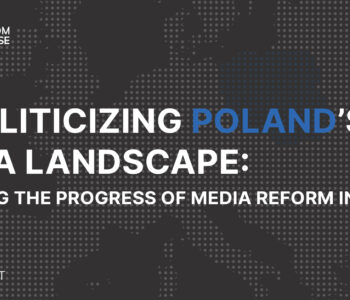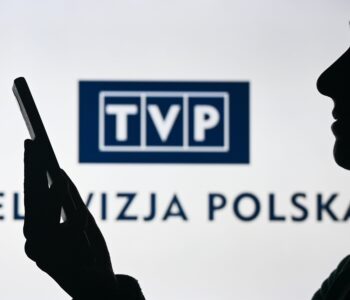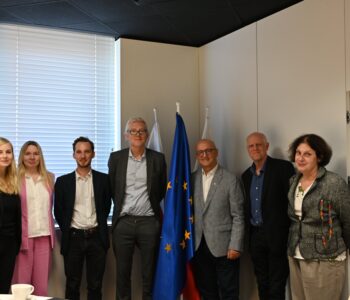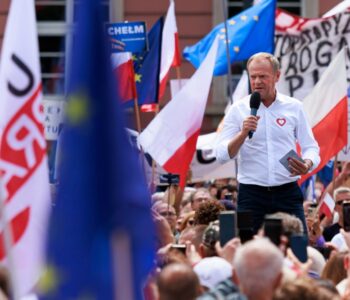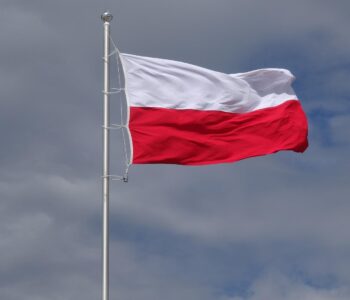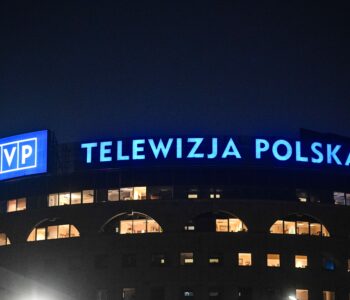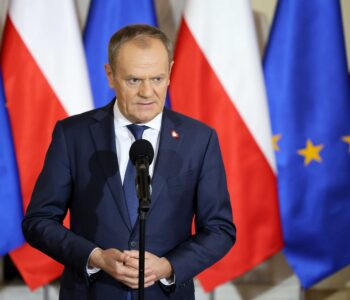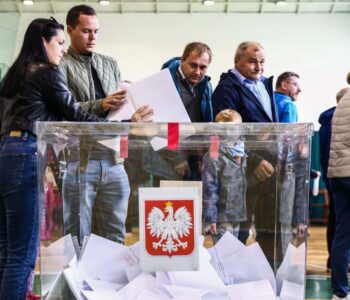After eight years of rule by the hard-right conservative Law and Justice (PiS) party, the new government will have a full plate as it sets out to rebuild Poland’s democratic pillars, from the courts to the state-owned media. The change in government could also usher in broader changes to the media landscape.
In the years after PiS came to power in 2015, the media freedom situation in Poland deteriorated sharply amidst an attack on critical and independent media.
The state-owned media was one of the government’s first targets: PiS swiftly pushed through legislation that allowed it to assert control over the country’s public broadcaster and established a National Media Council tasked with appointing the management of state-owned broadcaster TVP, Polish Radio and the PAP news agency.
These efforts to control the media extended to private media outlets too; for example, state-controlled oil company PKN Orlen purchased the country’s largest regional newspaper publisher Polska Press from its German owner in 2021, which resulted in most of the newspapers’ editors then being replaced and a marked switch in editorial lines favourable to PiS.
As outlined in a recent report by the Media Freedom Rapid Response (MFRR) produced ahead of the election, these pressures by PiS came on top of multi-pronged campaign of regulatory, financial and legislative pressure aimed at undermining the influence of major media critical of the government, including the use of Strategic Lawsuits Against Public Participation (SLAPPs).
While hopes are high this democratic opening in Poland will lead to a positive reform of the media landscape in line with EU values and roll back the media capture campaign of the previous government, the path forward is strewn with pitfalls and obstacles.
Spotlight on TVP
As the three opposition groupings — Tusk’s Civic Coalition, Third Way (an alliance of the agrarian Polish People’s Party and the centrist Poland 2050), and the Left — work on a coalition agreement, the spotlight is on TVP, which is notorious for its pro-Law and Justice coverage.
As the OSCE noted after the elections this fall, its “distorted and openly partisan coverage” helped provide a clear advantage to the ruling party. The MFRR report also highlighted the role of TVP in parroting the PiS party line and attacking the opposition parties.
Even before they won the elections, opposition leaders had indicated that it would be a priority for them if they came to power. “We will need exactly 24 hours for PiS government television to turn into public television,” said Tusk, who is expected to head the new government, at a pre-election rally in September.
However, in reality the process for reform looks set to take longer. The new government will have to reckon with the National Media Council, whose members’ term does not end until 2028. It is not simply a matter of changing the law: any attempts by the new parliamentary majority to amend media legislation could be blocked by President Andrzej Duda, who hails from PiS but left the party when he was elected president in 2015, using his right to veto. For this reason, an alternative approach is reportedly being considered: placing the public media in a state of liquidation, in which case they would be managed by receiverships – a form of compulsory administration – which the NMC would be unable to dismiss.
“A lot of things can be done without changing the existing laws, on the basis of currently existing law and with a parliamentary majority,” said Szymon Hołownia, the leader of the Poland 2050 party, in a conversation with Super Express broadcast on October 30, referring to the public media.
In this context, the National Media Council warned in a statement published on October 27 that “an attempt to undermine the laws, e.g. by repealing resolutions on the appointment of members of the National Broadcasting Council and the National Media Council, who have a statutory six-year term of office, by liquidating public media companies, or by any other means that circumvents the statutory procedure, will be a violation of the law and the Constitution. The very announcement of the liquidation of the public media is an act to the detriment of Polish culture and raison d’état.”
As outlined by IPI in a previous analysis, the NMC – a body established by PiS after a controversial change to the media law – has been an integral part of the institutional machinery of media capture which PiS has constructed in the last few years. While the PiS-dominated body seems determined to dig in and block democratic reform to the broadcasters it oversees, addressing the broadcaster’s spread of disinformation and party propaganda is seen as being vital moving forward.
However, the mechanisms used by the opposition to do so will be closely scrutinized by the EU. Media freedom groups will be urging the future government to ensure that any changes are enacted in a democratic and legal manner and aimed at restoring editorial and institutional independence to both the public media and its oversight bodies.
Rather than simply repeat the cycle of politicized purges and replacements enacted by previous administrations on both the left and right, the future government will face calls to ensure systemic reforms which reduce the influence of all ruling parties to meddle in the broadcaster’s management and editorial line. To do so, the government will have to look beyond short-term political opportunism towards more sustained democratic recovery.
The fate of Polska Press
Eyes are also on PKN Orlen, with speculation about what might happen to Polska Press amid the change in government and the expected changes in management at Poland’s state-owned companies — as well as media reports that Law and Justice plans to establish a new right-wing media company as the party moves into opposition. So far, Orlen has denied reports by news platform Onet that it plans to sell Polska Press rapidly before a new, opposition-led government is formed.
“Orlen has not and is not conducting any talks on the sale of Polska Press. The Orlen Group consistently implements its strategy, which is focused on the development of modern communication channels with customers, increasing digitization of sales formats and the construction of an e-commerce platform, among other things. The investment in Polska Press is part of this strategy, in particular in terms of building an integrated digital services platform,” wrote the company’s press office in its response to Onet.
Post-election changes at state-owned companies are also expected to have implications for spending on state advertising at private media outlets from across the political spectrum. Analysis of Kantar Media data by Tadeusz Kowalski, a media studies professor at the University of Warsaw, showed that state-owned companies have been spending higher amounts on advertising in media outlets that support the government. The abuse of state advertising funds to reward favourable coverage while draining critical media of revenue has long been criticized by international media freedom groups.
The matter of independent media regulation will also be on the agenda. Under PiS, the National Broadcasting Council, KRRiT, has been accused of abusing its licensing powers to create business uncertainty and applying arbitrary financial penalties to pressure independent newsrooms. Currently the influential regulator is dominated by PiS appointees. Creating the conditions for the body to be returned to democratic management by non-political figures will also face serious challenges.
With local and European Parliament elections scheduled for 2024, the stakes are high. While the post-election changes in Poland could usher in a new era of greater media freedom, undoing damage done by the outgoing Law and Justice government, there are several thorny issues to be dealt with — from the fate of TVP to that of Polska Press — and the new government will have to tread carefully.
The real challenge for the incoming coalition government will be to take a long-term view, ensuring that the reforms are not simply a purge, but democratic changes which fundamentally depoliticize the broadcasters and strengthen editorial independence from all governments, now and in the future.
 Event
Event




